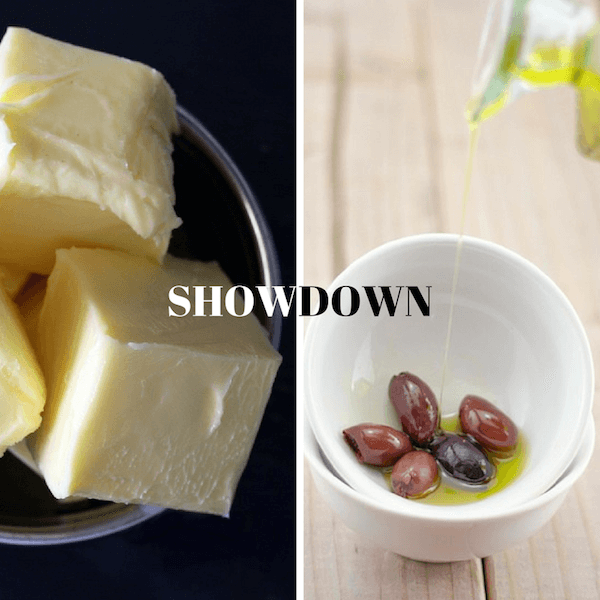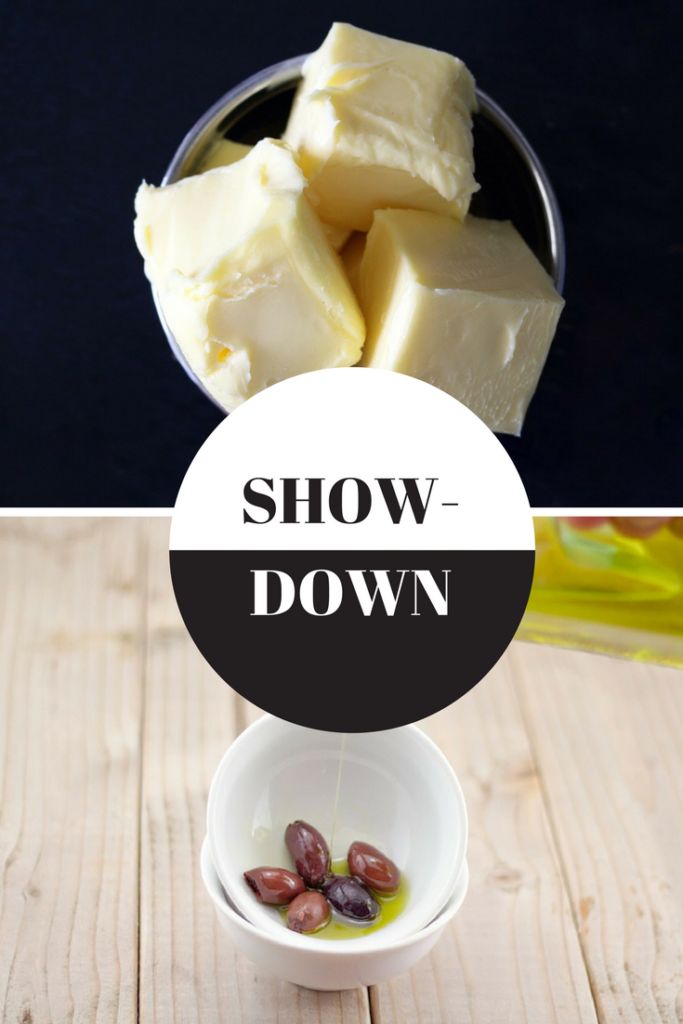Today, let’s learn about replacing butter with olive oil!

Replacing butter with olive oil is one of the first things you can do to begin your healthy Mediterranean lifestyle.
Cooking with butter is something a lot of people do every day. In addition to that, people will top their bread with it, bake with it, and cook with it. All in all, you may be consuming a lot more butter than you think.
Now I know there are recent findings that suggest saturated fats do not link to heart disease. An article called, “Is Butter Really Back,” by the Harvard Public Health does a good job of explicating the differences between fats and also touches on the recent findings. However, most doctors still advocate olive oil over butter, and as the article states, “In a recent study conducted in Spain, scientists gave subjects a free supply of either olive oil or mixed nuts for five years and watched both groups’ risk of heart disease drop. “
Thus, replacing butter with olive oil is still a smart choice. Do you have to do it 100% of the time? Heck no! Everything in moderation. We use butter maybe 10% of the week in foods we cook. Sometimes it adds the necessary flavors. Overall, as we all recommend, speak with your doctor about it if you’re wondering what your percentage should be.
Calories of Olive Oil vs Butter
In the Mediterranean diet, olive oil counts for most of the daily fat intake. The rest being from fish, and or other foods (nuts for example). And like all things, too much can be a bad thing as well. Olive oil is a highly dense caloric food, but doesn’t contain cholesterol, carbohydrates, or sugars.
Here is a comparison based on the nutritional information from USDA: butter, olive oil.
| Nutritional Info | Unsalted Butter – 1 tablespoon (14.5g) | Olive Oil – 1 tablespoon (13.4g) | Different of using olive oil |
| Calories | 102 | 119 | + 17 calories |
| Total Fats | 12g | 14g | + 2g |
| Saturated fats | 7g | 1.9g | – 5.1g |
| Polyunsaturated fat | 0.4 g | 1.4g | + 1g |
| Monounsaturated fat | 3 g | 10g | + 7g |
| Trans fats | 0.5 g | 0 g | – 0.5g |
| Cholesterol | 31 mg | 0 mg | – 31mg |
| Carbohydrate | 0g | 0g | + 0g |
- If using salted butter, expect added sodium of about 82mg
Monounsaturated fat
One of the this first things you may notice is the Monounsaturated fat section. Butter has 3 grams and olive oil has 10 grams!
What exactly is Monounsaturated fats anyhow? Rather than having us explain it, let’s see what the professionals have to say. According the the American Heart Association (AHA),
“Monounsaturated fats can help reduce bad cholesterol levels in your blood which can lower your risk of heart disease and stroke. They also provide nutrients to help develop and maintain your body’s cells. Oils rich in monounsaturated fats also contribute vitamin E to the diet, an antioxidant vitamin most Americans need more of.”
Most importantly, this type of fat is more healthy for you than trans fat and saturated fats (which butter has 5.1g more per serving than olive oil!).
How To Substitute Olive Oil For Butter
The moment of truth, how can I replace butter with olive oil? Luckily, there is a nifty chart here to help you do just that!
| Butter | Olive Oil |
| 1 teaspoon | 3/4 teaspoon |
| 1 tablespoon | 2 1/4 teaspoons |
| 2 tablespoons | 1 1/2 tablespoons |
| 1/4 cup | 3 tablespoons |
| 1/3 cup | 1/4 cup |
| 1/2 cup | 1/4 cup + 2 tablespoons |
| 2/3 cup | 1/2 cup |
| 3/4 cup | 1/2 cup + 1 tablespoon |
| 1 cup | 3/4 cup |
Things to Keep In Mind When Replacing Butter With Olive Oil
Do you really need all that butter in the first place? Sure, if it’s your first time baking something, you may not want to stray. However, if it’s a dish you make often, potentially cutting back could save you hundreds of calories. Try experimenting to see!
While the above is a great guide, we’ve found times where we could use less, or even sub in some Greek yogurt (future posts on that) to achieve the desired outcome.
I’ll probably shoot myself in the foot here by saying this, but using more than ¼ cup of olive oil in any recipe may need to be re-evaluated. Whether it’s butter or oil, the calories will quickly begin to rise beyond this point, but be smart in the kitchen. The main reason Greeks or Mediterranean diet followers rely on olive oil is because they cook fresh things, minimally processed, and focus more on non-meat items, so they’d hardly be in a position to use more than ¼ cup of olive oil.
This is of course our experience as we’ve been learning about this and exploring Greek Mediterranean cuisine. At the end of the day however – it’s your kitchen, so it’s your rules. Use what you think is best.
We hope this helped clear up any questions you may have about replacing butter with olive oil. It’s a great thing to do, but as we said, we don’t want to make butter the villain, everything in moderation. If you are interested in following the Mediterranean diet, you’ll be reaching for the liquid gold vs butter however, and that’s never a bad thing.



